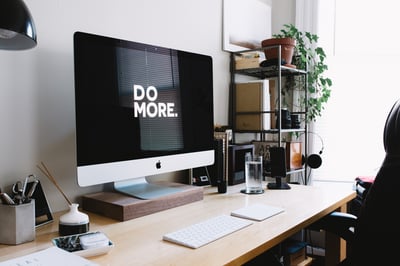June 16, 2020
 by Jeff Kahn / June 16, 2020
by Jeff Kahn / June 16, 2020

For many, "being productive" is at odds with getting a good night's rest. Here's why you won't get one without the other.
If you're looking for ways to be more productive, it's unlikely you're thinking about sleep, or its biological cousin, the circadian rhythm. Yet both are – perhaps counterintuitively – fundamental to being productive, feeling good, and performing at your best.
To understand why your productivity derives from sleep. Or, to be more specific, meeting your sleep need and your circadian rhythm, you need to know about the Two Laws of Sleep, known to sleep scientists as the "Two Process Model of Sleep Regulation”.
The first law pertains to sleep debt: the difference between the amount of sleep you get and the amount of sleep you need, over a roughly 14-day period. Each of us has a genetically-determined sleep need, just like our height. The average need is eight hours and 10 minutes. Most of us require between just over seven and nine hours of sleep per night.
Sleep debt is the single most important metric when it comes to your sleep. Every negative consequence you've heard about from lack of sleep – be it physical, emotional, or cognitive – redounds to the amount of sleep debt you're carrying.
Critically, sleep debt and its impacts start to mount immediately with 'short' sleep. As professor of neuroscience and sleep expert Matt Walker writes in Why We Sleep:
“The recycle rate of a human being is around 16 hours. After 16 hours of being awake, the brain begins to fail. Humans need more than 7 hours of sleep each night to maintain cognitive performance. After ten days of just seven hours of sleep, the brain is as dysfunctional as it would be after going without sleep for 24 hours."
The consequences of sleep debt for productivity are particularly acute. This is because the “executive functions” of the brain – mental processes like reasoning, problem-solving, and decision making, all of which are essential to performing our jobs – are governed by the prefrontal cortex, which is severely impaired by lack of sleep.
While other parts of the brain can cope reasonably well under conditions of sleep deprivation, neuroscientists have found the prefrontal cortex cannot. Basic visual and motor skills, for example, directed by the occipital and cerebellum lobes of the brain respectively, degrade when sleep is deprioritized, but they do so not nearly to the same extent as these higher-order mental skills.
The second law of sleep concerns the circadian rhythm. One of the best ways to understand the circadian rhythm is as a biological clock that governs when every cell in your body should be active or at rest.
Your circadian rhythm tells you when to be awake and when to be asleep – affecting the duration of your sleep and what your brain does at night. It also modulates our waking behavior, affecting peaks and dips in energy throughout the day. As such, it has direct bearing on a number of fundamental cognitive functions, including our ability to pay attention, learn new skills, memorize and recall, the building blocks of productivity.
Circadian misalignment, such as when you’re jetlagged, or not keeping regular sleep hours, is associated with poorer academic performance and other deleterious mental and physiological outcomes.
We'll explore how to take advantage of your circadian rhythm for productivity a little later. First, we'll return to the concept of sleep debt and detail exactly how it undermines cognitive performance.
There’s almost 100 years of sleep science exploring the negative impact of sleep debt on workplace performance. This research reveals:
Sleep debt also degrades productivity by undermining our emotional control and thus interpersonal and team dynamics. With sleep deprivation comes:
If sleep is so important to productivity, why don't organizations, leaders, and we ourselves prioritize it? The answer is complex and multifaceted, but here's our take.
First, there's our broad societal apathy towards sleep. "I'll sleep when I'm dead" is a maxim of the corporate lexicon. Not only does the American business community view sleep as expendable, we imprudently glorify leaders who profess to go without.
Caffeine may be another reason, since we can use it to very effectively counteract fatigue. What most people don't know is that caffeine stays in your system for 10 hours, and can trigger a vicious cycle of sleep deprivation when consumed too late in the day.
The most interesting reason by far, however, is what sleep scientists have shown to be our human inability to correctly assess our own sleepiness and resulting performance declines.
Indeed, if you're reading this and thinking you don't need between seven and nine hours of sleep a night or don't see your lack of sleep affecting your productivity, you're wrong – but you're not alone. There's been a sizable amount of research into this phenomenon and it shows significantly sleep-deprived individuals tend to rate themselves as only moderately sleepy.
As study participants become more sleep deprived, their subjective sleepiness plateaus while their actual performance linearly declines. This article describes:
"Lack of sleep apparently tricks you into thinking you’re an office all-star. People who slept just six hours per night for two weeks functioned as poorly as if they’d gone without sleep for 48 hours, yet they thought they were performing at the top of their game."
The great news is that improving our sleep – and reaping the rewards for productivity – is in our control. So is taking advantage of your circadian rhythm. Before we dive into how to get the sleep you need, as well as how to time your activities with your circadian rhythm, a quick note about "sleep quality".
Understanding the mechanics of sleep debt, your circadian rhythm, and how they work together to support productivity is the educational foundation to support changing your behavior to prioritize sleep.
Given the extent to which the various sleep stages have made their way into everyday conversation, it's worth noting why our emphasis is on sleep debt, or the quantity of sleep you're getting, and not on the time spent in REM, light sleep, or deep sleep – a breakdown often equated with sleep quality.
The reason we talk about sleep debt, a measure of quantity, is that none of those other variables (restlessness, REM, deep, etc.) have an impact on how you're going to feel or perform the next today.
In fact, there's some amazing research from sleep and machine learning scientists at Stanford: they took all of the best "sleep quality" data from polysomnography (the gold standard when it comes to measuring sleep) to figure out if they can predict how you feel in the morning. Turns out, they can't.
This is not to say that the stages of sleep aren't important – they are, very much so, but there are three things to know:
To fall asleep and stay asleep, your sleeping environment must be conducive to sleep. It’s recommended to make your bedroom cool, dark, and quiet, like a cave.
And now, to return to your circadian rhythm. As we've discussed, meeting your sleep need is a fundamental requisite for productivity. The other key lever is your circadian rhythm.
When it comes to thinking about how your circadian rhythm affects your daily energy levels, it helps to visualize the number 3 or a lowercase m, tipped to its side – an illustration of the rolling wave of energy peaks and dips we experience over the course of the day.
Everyone has two natural energy peaks per day. For many, these fall in the late morning and late afternoon. These are times when your body is alert and ready to perform.
Similarly, everyone has two energy dips per day. The first occurs in the early afternoon and the second comes in the evening as we wind down for bed. This is when your body is naturally relaxed and in recovery. If you’re carrying sleep debt, you will feel these dips more profoundly. Low to no sleep debt will optimize the peaks.
When you experience these peaks and dips depends on light exposure and your chronotype. Your chronotype – a product of your age, gender, and genetics – is the “bias” of your internal clock, relative to society’s 24-hour clock.
Late chronotypes, or “night owls” have an internal clock longer than 24 hours. Early chronotypes or “morning larks” have an internal clock shorter than 24 hours. What’s important to note is that your energy schedule is unique to you and it will be slightly different every day, depending on your exposure to light.
Understanding your circadian rhythm is key to truly being productive. Rather than try to indiscriminately accomplish tasks throughout the day, you can now schedule your daily activities across your peaks and dips based on the amount of focus and energy they require.
Here’s what a daily routine, optimized for productivity, might look like:
As energy levels ramp, plan your day. Review your inbox. Check Slack. Sip that single origin coffee or some fresh pressed black tea to ease that morning grogginess, but limit your caffeine intake as the day continues. Getting sunlight first thing is essential. Pairing that with exercise will help with that night’s sleep.
This is the time for work that requires your highest level of focus--strategizing, pitching, connecting with clients or prospects--or most emotionally-demanding activities, like prospecting and dealing with obstacles or rejections.
Reserve this time for administrative items like emails or CRM updates, a company all-hands, or webinar watching. This energy lull you feel after lunch is part of a normally-functioning circadian rhythm and not a food hangover! On the weekends, consider household chores, exercise, or a nap for this time.
Use this peak for another high-focus project or collaborative effort before starting your evening wind-down.
Although it's easy to find ourselves working round-the-clock, the science shows that an evening wind-down promotes quality sleep which, in turn, increases next-day productivity. Activities that will prime your body for sleep including taking a hot shower, reading, or implementing evidence-based relaxation strategies like Progressive Muscle Relaxation (PMR).
During this wind-down it’s important to reduce blue light (which suppresses melatonin so you stay awake longer). Turn your devices to “Night Shift,” cap screen time and if Netflix is a must, put on your blue-light blocking orange glasses. It’s also a good idea to limit stress or excitement-inducing activities.
There’s an entire industry devoted to “hacking” productivity. The truth is, none of these hacks will work until you’ve reduced your sleep debt and scheduled your activities with your circadian rhythm.
Jeff Kahn is Co-Founder and CEO at Rise Science, a sleep technology company that works with sales organizations to unlock the real-world benefits of better sleep.
As a sales leader, you know how critical it is to get your mix of KPIs exactly right, and...
 by Jeff Kahn
by Jeff Kahn
Even during periods of relative calm, employees have to contend with the necessary stresses of...
 by Jeff Kahn
by Jeff Kahn
Workplace productivity isn't about constantly pushing ourselves to do more in every single...
 by Lisa Steingold
by Lisa Steingold
As a sales leader, you know how critical it is to get your mix of KPIs exactly right, and...
 by Jeff Kahn
by Jeff Kahn
Even during periods of relative calm, employees have to contend with the necessary stresses of...
 by Jeff Kahn
by Jeff Kahn


